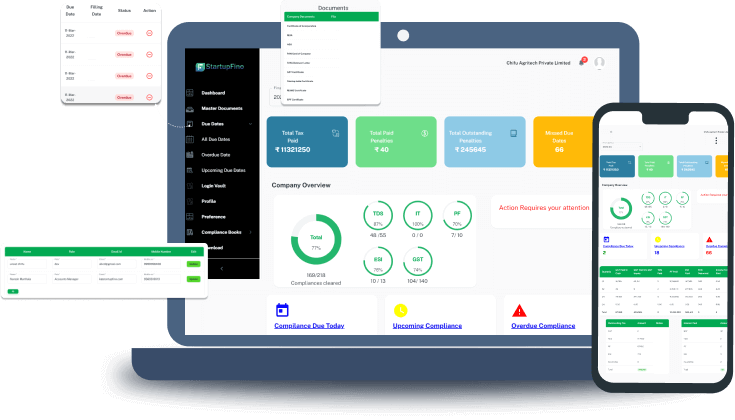Benefits of Startups Financial Modelling in Rajasthan
There are certain benefits offered by financial modeling for startups in Rajasthan which are as follows:
Financial Planning and Forecasting
Financial modeling for startups is to create detailed financial projections and forecasts. It helps in understanding the potential financial outcomes and also assists in setting realistic goals for the business. It allows entrepreneurs of startups to plan for different scenarios and make informed decisions based on the projected financial performance.
Fundraising and Investor Communication
Startups do often require raising capital for future growth. A well-constructed financial model provides a comprehensive view of the business's growth potential, financial health, and expected returns. It mainly enhances the credibility of the startup while presenting to potential investors. This demonstrates a thorough understanding of the financial aspects of the nature of business.
Capital Allocation and Resource Planning
Financial modeling helps in optimizing the allocation of financial resources. By analyzing the financial projections, startups can identify areas of high profitability, cost inefficiencies, and cash flow bottlenecks. This enables them to allocate resources strategically, make informed investment decisions, and manage cash flow effectively.
Risk Assessment and Mitigation
Financial modeling allows startups to conduct sensitivity analysis and assess the impact of various risks and uncertainties on the business's financial performance. By identifying potential risks and their financial implications, entrepreneurs can develop contingency plans and mitigate potential adverse effects.
Valuation and Exit Strategy
For startups seeking eventual exit opportunities, such as acquisition or initial public offering (IPO), financial modeling plays a crucial role in determining the company's valuation. By forecasting future financial performance, startups can estimate their valuation and negotiate better terms during funding rounds or exit negotiations.
Performance Monitoring and Accountability
A financial model serves as a benchmark as the startup's actual financial performance can be compared. With the regular update of the model with actual financial data, entrepreneurs can monitor progress of the company, identify deviations from the plan, and take corrective actions promptly. It enhances accountability and facilitates proactive decision-making.
Strategic Decision-Making
Financial modeling for startups provides a structured framework for evaluating strategic decisions. This allows entrepreneurs to assess the financial implications of various options, such as new product launches, market expansions, pricing changes, infrastructure as well as investment in technology. It further helps in making well-informed decisions that align with the startup's financial objectives.
Types of Financial Modelling for Startups
There are various types of financial modeling for startups which can utilize to analyze different aspects of their business, some are mentioned below:
Revenue Forecasting Model
This model focuses upon estimating the future of startup revenue streams. It takes into account factors such as market size, pricing strategy, customer acquisition, and growth rates to project sales figures over a specific period of time. Revenue forecasting models help startups in understanding their revenue potential and plan accordingly.
Expense Model
Expense model helps in estimating and tracking the startup's operating expenses. It mainly includes fixed costs such as utilities, salaries, rent, etc and also includes variable costs such as marketing expenses, cost of goods sold, etc. Expense models help startups in identifying their cost structure, cost-saving opportunities, and manage the cash flow effectively.
Cash Flow Model
Cash flow model is very important for the startups as it assesses the availability and timing of cash inflows as well as outflows. A cash flow model tracks down every movement of cash flow during the course of the business. This includes the factors such as investments, expenses, revenue, and other financing activities. It enables startups in managing their cash flow, planning for potential cash shortages, and making informed decisions about funding requirements.
Valuation Model
Valuation models determine the worth value of a startup. It involves various factors, such as growth prospects, financial performance, market dynamics, and comparable company valuations, to arrive at an estimated value for the business. Valuation models mainly help startups to understand their current value which can be useful at the time of fundraising, M&A discussions, or when considering exit strategies.
Financing and Fundraising Models
Startups require funding to support their growth. Financing and fundraising models help in deciding the financing options, such as debt financing, equity financing, or government grants. These models in knowing the impact of different funding scenarios on the startup's such as capital structure, ownership dilution, and financial metrics.
ROI and Investment Models
ROI (Return on Investment) and investment models evaluate the financial feasibility and potential returns of specific investment opportunities or projects. Startups can use these models to assess the viability of new product launches, investment in infrastructure or expansion into new markets. ROI and investment models help in making informed investment decisions and prioritize resource allocation.
Approaches of Financial Modelling
There are various approaches to financial modeling that can be employed depending on the specific needs and requirements of a startup. Here are four common approaches to financial modeling which has been discussed:
Historical Data Analysis
This type of approach involves analyzing historical financial data which further helps in understanding the past performance and trends of the startups. It entails gathering transaction records, financial statements, and other relevant data from previous periods. By examining the historical data, startups can identify patterns, growth rates, and seasonality, which can be used as a basis for projecting future financial performance.
Top-Down Approach
The top-down approach starts with the macro-level analysis of an industry or market. This further derives the startup's financial projections depending upon the market data and industry trends. Startups may consider factors such as growth rates, market size, and market share to estimate the revenue potential. The top-down approach is useful when startups are targeting specific market segments or when there is limited historical data.
Bottom-Up Approach
The bottom-up approach helps in building up the financial model based on specific operational drivers and assumptions. Startups start by estimating their business, such as number of customers, units sold or average revenue per customer. These assumptions are then used to calculate expenses, revenue, and cash flow. This approach allows for a more granular analysis and a detailed understanding of how different factors impact the financials.
Scenario-Based Modelling
Scenario-based modeling helps in creating multiple financial models based upon different scenarios or assumptions. Startups can develop best-case, moderate-case and worst case scenarios while analyzing the potential financial outcomes under different circumstances. This particular approach allows startups to assess their financial resilience and plan for various future contingencies. It also helps in evaluating the impact of changes in key variables or external factors on the financial performance of the business.
Steps to create Startup Financial Model
There are few simple steps that is required to be followed for developing financial modeling for startups as discussed below:
Gather Data and Information
Firstly collect all the relevant financial and non-financial information about the startup. This includes historical transaction records, financial statements, market research, industry benchmarks, and any other data necessary to understand the business and its operations.
Define the Model's Purpose
Clarify about the objectives and scope of the startup financial model. Determine the specific questions or scenarios of the model such as funding requirements, revenue projections, or valuation analysis. This will help guide the structure and focus of the financial model.
Use the Model for Decision Making
Utilize the financial model as a tool for decision making. It is for assessing the impact of strategic choices, evaluating different scenarios, and making informed decisions about the startup's operations, growth strategies and financing needs. The regular review and update of the model helps to align the evolving needs of a startup.
Identify Key Assumptions
Identify the critical assumptions that will drive the financial model. These may include factors such as revenue growth rates, customer acquisition costs, pricing strategy, gross margin, churn rates, and operating expenses. Based on these assumptions on market research, industry benchmarks, a deep understanding about startup is gained in specific circumstances.
Build a Revenue Model
Create a revenue model which estimates the startup's sales or revenue streams. Consider different revenue sources, potential customer segments and pricing tiers. Determine the revenue growth and develop formulas or calculations to project future revenue based on the identified assumptions.
Project Expenses
Estimate the startup's variable costs such as cost of goods sold, marketing expenses etc and operating expenses, including fixed costs such as utilities, rent, salaries, etc. Break down expenses into relevant categories and develop formulas or calculations to project future expenses based on the identified assumptions.
Create a Profit and Loss Statement
Create a profit and loss (P&L) statement which summarizes the startup's expenses, revenue, and profitability over a specific period, mainly on a monthly or yearly basis. Ensure that all revenue and expense items are accurately captured in the P&L statement, including taxes, depreciation, and interest expenses.
Develop a Cash Flow Projection
Construct a cash flow projection which determines the expenses and revenue forecasts. This projection must include cash inflows from revenue, financing activities, investments as well as cash outflows for expenses, debt repayments and capital expenditures. Consider the timing of cash flows and account for any cash flow gaps that may arise.
Develop a Balance Sheet
Make a balance sheet that reflects the startup's liabilities, assets and shareholders' equity. It must include both current and long-term assets, liabilities, such as accounts receivable, cash, inventory, debt, and equity. Ensure that the balance sheet remains in balance by accounting for further changes in assets and liabilities over a period of time.
Conduct Sensitivity Analysis
Perform sensitivity analysis by adjusting key variables and assumptions in order to understand the impact on the financial model. Test different scenarios and assess how changes in revenue, expenses, or other variables affect the startup's financial performance and cash flow. This analysis helps identify the most critical drivers and risks.
Document Assumptions and Methodology
Clearly document the assumptions, calculations, and methodologies used in the financial model. This documentation ensures transparency, allows for easy updates, and enables others to understand and use the model effectively.
Validate and Refine
Continuously validate and refine the financial model by comparing the projections to real-world data and adjusting the assumptions as needed. Incorporate actual financial results into the model and assess the accuracy of the projections. Regularly update the financial model to reflect new information or changes in the startup's circumstances.































































